Romania’s maritime resilience in the age of hybrid threats and the importance of a Maritime Security Strategy
There have been enough times in history when the future of our country, both in terms of opportunities and challenges, seemed to be increasingly linked to the Black Sea maritime space. However, nowadays, more than ever, we are becoming more and more aware of the importance of this maritime space for the future of our country and of each one of us. Unfortunately, however, the Black Sea is no longer just the supplier of immense resources which, if exploited rationally, could provide the basis for human existence, nor is it the area of understanding and cooperation between the nations bordering it that it was decades ago.
Romania’s resilience – maritime resilience – ideas, models and perspectives,
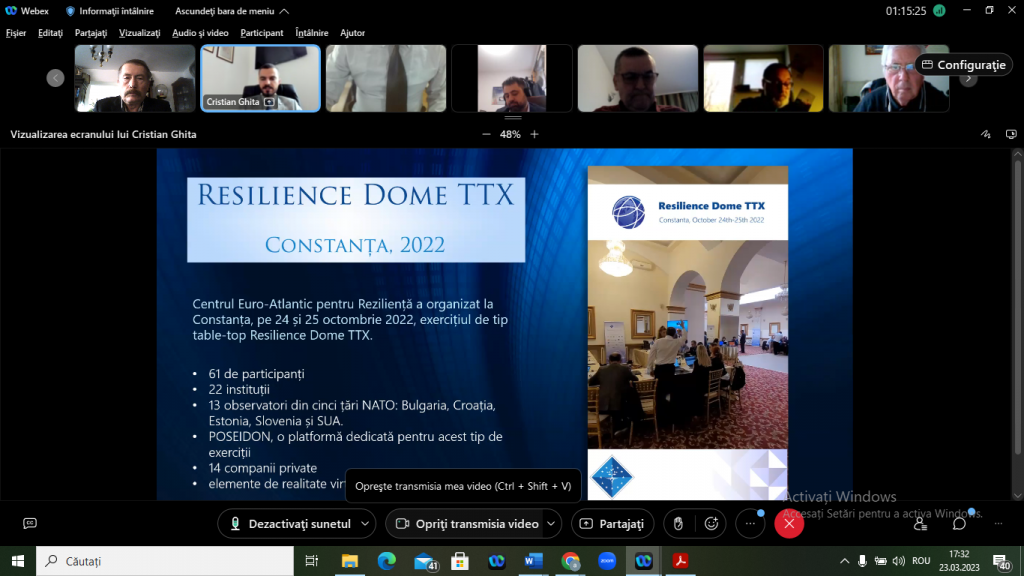
On 23 March 2023, the Maritime Security Forum was held online, starting with the presentation of the Euro-Atlantic Centre for Resilience – E-ARC under the Ministry of Foreign Affairs by Mr Cristian Ghiță.
The topics presented allowed the identification of issues of common interest for the two structures and highlighted the study objectives in the field of maritime resilience, specific to Romania.
Enjoying a select participation, the discussions allowed the extraction of ideas and opinions particularly valuable and useful for the further study and deepening of the subject of Romania’s maritime resilience, at national level, as well as its integration into NATO and the EU.
The general conclusions underlined the need to develop a Maritime Policy for Romania, a Maritime Strategy, as well as specific plans, in line with its interests and highlighted the specific needs and models for approaching the subject.
Among the topics of discussion were those related to the actual ways of assessing the degree of resilience in line with the desired one, which is necessary not only at macro/national level, but also at the level of lower level structures and entities.
The creation of a national strategic guidance mechanism is a key element in the development of sectoral and cross-sectoral strategies, a mechanism based on the interdisciplinary nature of the field and linked to other sectors such as the economy, legal, health, internal and external affairs, among others.
The need to update Romania’s National Security Strategy and Military Defence Strategy, among others, has been identified in order to adapt them to the conditions created by the emergence and conduct of the war in Ukraine and the new multipolar trends in the world. As are other states!
The resulting conclusion on the mechanism for achieving and assessing resilience, not only in the maritime domain, should in future also include a broader contribution from elements outside the governmental space, with reference to the involvement in various forms of non-governmental organisations, but also of the civilian economic and social components.
The point made about the growing importance of the Caspian Sea, which provides Russia with a place from which to act in a protected manner, only serves to increase the importance of the Black Sea, with its specific legislation generated by the provisions of the Montreux Convention. The only possible way to counteract this is to equip the real democratic countries bordering the Caspian Sea with credible naval equipment.
The question of what to equip them with and how to ensure that they are equipped is a very topical issue. Romania must adopt intelligent solutions by developing its own capabilities, but at the same time take into account the factors related to the deadlines and the need for timely implementation. And here we have many failures!
There is a common desire among various governmental and other bodies and agencies to contribute to the achievement of Romania’s resilience objectives. The coordinating role of course lies with the governmental structures, but closer cooperation with the academic, economic and non-governmental sectors would have an increasingly effective and realistic result.
Many of the topics debated will return to the activities of the WSF and its collaborators in the form of debates dedicated to them.
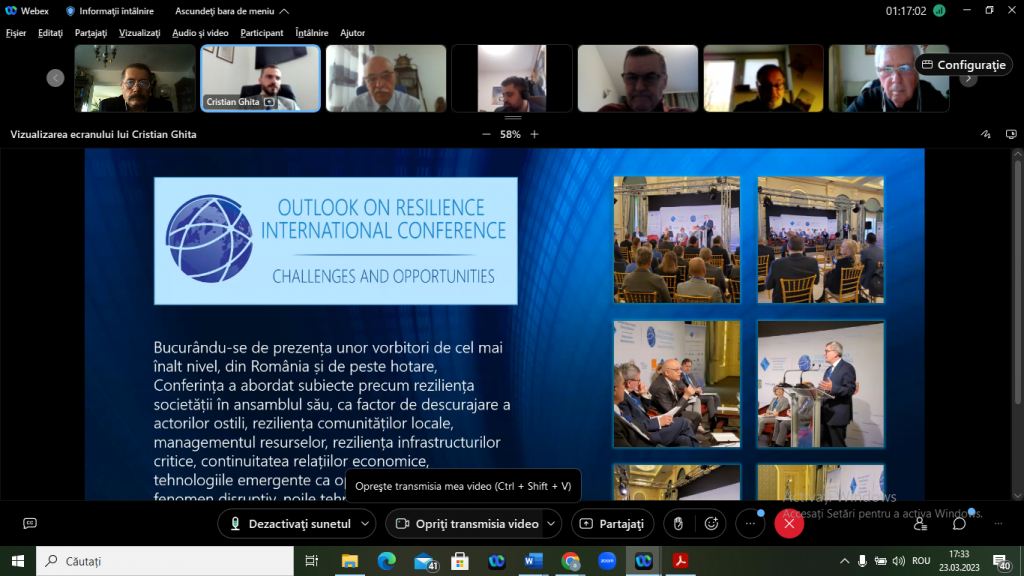
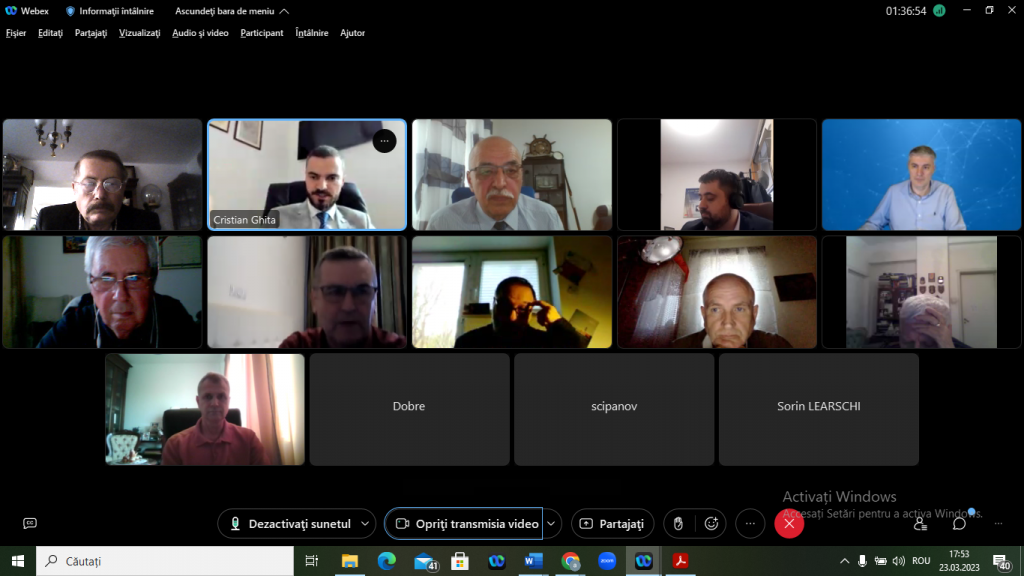
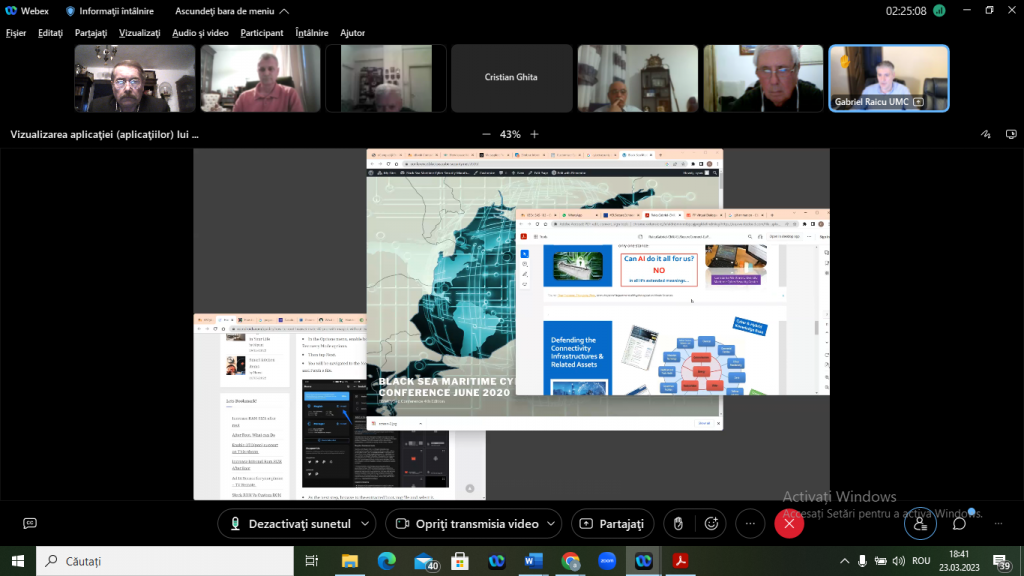
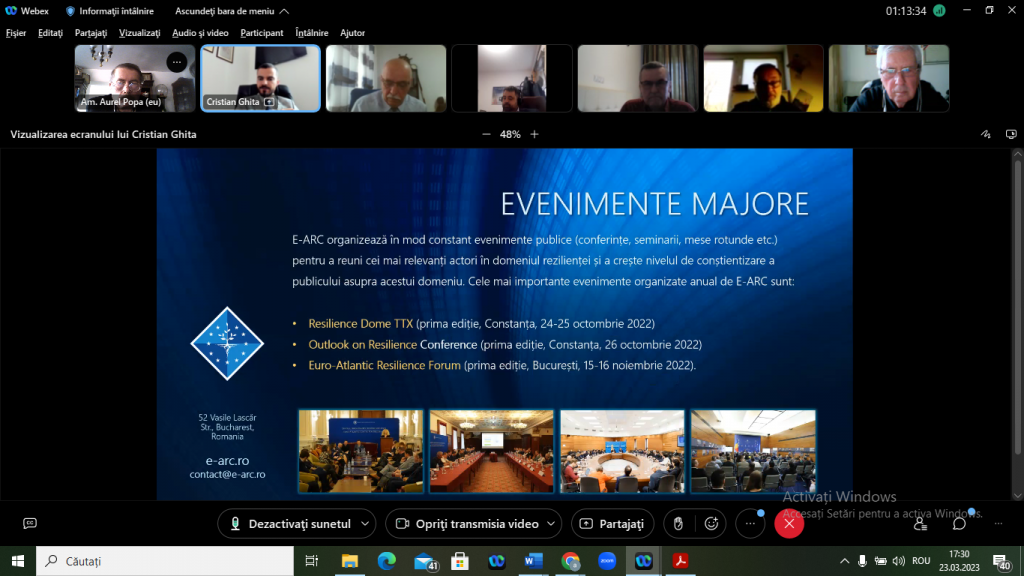
Conference “Romanian Military Thought”
15 -17 NOV 2022, Bucharest, National Military Circle
Summary by PhD. Constantin Ciorobea
THEME: Dynamics of the security architecture in the wider Black Sea area, in the context of the conflict in Ukraine and the new NATO strategic concept
The CLUBUL AMIRALILORS was present, through the MARITIME SECURITY FORUM, on Wednesday, November 16, at the international conference “Romanian Military Thought”, an event with the theme “Dynamics of security architecture in the wider Black Sea area, in the context of the conflict in Ukraine and the new NATO strategic concept”. As a partner of the conference organized by the Defence Staff, the Maritime Security Forum organized the panel entitled “Information and Security”, moderated by Cam (Rz) Constantin CIOROBEA and Cdor (Rz) Ioan CRĂCIUN, members of the Maritime Security Forum leadership. The conference was also attended by RAdm (r) Ion CUSTURĂ
The panel included presentations by Olga R. CHIRIAC / Centre for Strategic Studies, National School of Political Defence Studies, Bucharest, Plamen BOGDANOV / University of Library and Information Technologies, Sofia, Bulgaria, Șerban GRIGORAȘ-STĂNESCU / National Defence University “Carol I”, Bucharest, Mario MARINOV /University of Library Science and Information Technologies, Sofia, Cdpr (Rz) Ioan CRĂCIUN / National Institute for Research and Development in Informatics, Laurențiu-Paul MÂNDRAȘ / Ministry of National Defence, Bucharest.
The panel discussions focused on the relationship between intelligence and the concept of security (national and international) in order to explain and promote common defence policies, resulting from decisions taken not only at NATO Summits over the last decade, but also at the European Union level.
The instability of modern society, the new arms race, asymmetric threats, cyber security or the impact of artificial intelligence on security are just some of the issues that have resulted in a review of the priorities of international security and defence actors. The conflict in Ukraine is the latest challenge to the security environment and the scale of the crisis will undoubtedly trigger significant effects on global security. How the major players will manage the effects of the crisis was a question that participants with expertise in different fields tried to answer.
The topics presented during the panel were:
- Olga R. CHIRIAC/ Centre For Strategic Studies, National University Of Political Studies And Public Administration, Bucharest, Romania
“Perception, Cognitive Dissonance And Nuclear Deterrence In The Information Age, Possible Implications For The Euro-Atlantic Security Architecture In The Context Of A New Nato Strategic Concept” - Plamen BOGDANOV/ University Of Library Studies and Information Technologies Sofia, Bulgaria
“The Role of the National Security Strategy in the National Security of the United States of America”. - Șerban GRIGORAȘ-STĂNESCU/ “Carol I” National Defence University, Bucharest, Romania
“General Characteristics of the Kaliningrad Region” - Mario MARINOV/ University Of Library Studies and Information Technologies, Sofia, Bulgaria
“The Strategic Nuclear Treaty Regime at a Crossroads. The (Im)Possible Search for a New Point of Balance?” - Ioan CRĂCIUN / National Institute For Research & Development In Informatics – Ici, Bucharest, Romania
“The Black Sea’ Strategic Importance And NATO’s Role In Countering The Kremlins’ Military Sea” - Laurențiu-Paul MÂNDRAȘ/ Ministry of National Defence, Bucharest, Romania
“The Digital Era and Its Implications on the International Security Environment. Digital Confrontations in Cyber Space and Real Space”.
RMT Conference 2022, Day 2, Academic panel Intelligence and Security – (892) RMT Conference 2022, Day 2, Academic panel Intelligence and Security, live streaming – YouTube
https://gmr.mapn.ro/pages/conferinta2022-acasa
The Romanian Military Thought 2022 Conference was organised by the Romanian Defence Staff, in the context of the 163rd anniversary of the establishment of the Romanian Defence Staff.
KEYNOTE SPEAKERS
- GEN Daniel PETRESCU – Chief of Defence Staff
- H.E. Bogdan Lucian AURESCU – Minister of Foreign Affairs
- Florin Marian SPĂTARU – Minister of Economy
- H.E. Mircea GEOANĂ – NATO Deputy Secretary General
- David MUNIZ – Chargé dʼAffaires, US Embassy in Romania
- Iulian CHIFU – State Advisor to the Romanian Prime Minister for Foreign Relations, Security & Strategic Affairs
- H.E. Sorin DUCARU – Director, European Union Satellite Centre
CONTEXT
The global and, more importantly, regional security paradigm has changed dramatically since 24 February 2022, the day the Russian Federation invaded Ukraine. The event has affected peace and severely altered the security environment, generating widespread instability and heightened strategic and systemic competition, involving operational aspects of defence and deterrence, capability enhancement, technology and industry analysis, the rules-based international order and the redefinition of multilateral strategy.
In this context, the NATO Strategic Concept 2022, adopted on 29 June at the NATO Madrid Summit, identifies the Russian Federation as the most significant and direct threat to the security of Allies and to peace and stability in the Euro-Atlantic area, as it uses conventional, cyber and hybrid means to undermine the rules-based international order. NATO will therefore continue to respond to Russia’s threats and hostile actions in a unified and responsible manner, adopting a 360-degree approach to deterrence and defence, involving not only a mix of capabilities, including space and cyber, but also multi-region or multi-domain approaches. In these circumstances, the People’s Republic of China is seen as a systemic competitor. Therefore, as the challenges are increasingly global in nature, NATO must adapt in order to respond to them.
The Strategic Concept cites maritime security as of paramount importance to peace and prosperity, with allies expressing their determination to strengthen posture and situational awareness to deter and defend against all maritime threats, uphold freedom of navigation, secure maritime trade routes and protect key lines of communication. In view of the above, the Black Sea region, together with the Baltic and Mediterranean Sea regions, are areas of strategic interest for NATO. The Alliance is therefore determined to ensure that the deterrence and defence posture remains credible, flexible, responsive and sustainable, which implies robust, multi-domain, combat-ready forces on the ground, improved command and control arrangements and pre-positioned equipment.
Romania, as a country in the Black Sea region, as well as a NATO and EU member state on the Eastern flank, must remain a pillar of stability and a provider of security in the region. The new Strategic Concept reaffirms that NATO’s key aim is to ensure the collective defence of its members, based on a 360-degree approach and in line with its three core missions (deterrence and defence, crisis prevention and management, and security through cooperation). Moreover, the objective of the EU’s Strategic Bus is to make the Union a stronger and more capable security provider, able to protect its citizens and contribute to international peace and security. In this context, the Strategic Concept and the Strategic Compass should be coordinated in order to guarantee Euro-Atlantic security, including through capability development initiatives. Concrete steps have been taken to strengthen deterrence and defence posture on the Eastern flank, in particular after Russia’s invasion of Ukraine.
In doing so, the Allies strengthened existing battle groups and agreed to establish four additional multinational battle groups in Bulgaria, Hungary, Romania and Slovakia to ensure NATO’s extended presence along the Alliance’s eastern flank. Furthermore, at the 2022 NATO Summit in Madrid, the Allies agreed to increase the level of multinational battlegroups from battalion to brigade, where and when necessary. In addition, many activities undertaken by Allies at national level have contributed to increased activity on the Eastern flank. The Allies have deployed additional ships, aircraft and troops to NATO member states in Eastern Europe, further strengthening the Alliance’s deterrence and defence posture. The US has strengthened its military presence in Poland, Romania and other allied countries in the East. Other allies, including the UK, the Netherlands, Spain and France have also announced additional military deployments in Romania, Bulgaria and the Black Sea. The Royal Netherlands Air Force has deployed F-35 fighter jets to Bulgaria in support of NATO air policing missions.
For Romania, the French Armed Forces have reinforced the forward presence of NATO’s multinational battle group with the SAMP/T – MAMBA surface-to-air missile defence system in support of the Alliance’s initiative to deter and defend Europe’s eastern flank. From May 2022, the French Air Force has deployed the state-of-the-art MAMBA medium-range surface-to-air system and a defence management centre in Romania. In order to increase the efficiency of the system and to meet the needs of NATO’s Integrated Air and Missile Defence System, it is connected and integrated to the Romanian and NATO defence systems through a tactical data link. France is the framework nation, supported by an alternative company of Belgian or Dutch troops.
As for the national effort, Multinational Corps Command South-East (Sibiu), Multinational Brigade Command South-East (Craiova) and Multinational Division Command South-East (Bucharest), providing command and control of NATO land operations at corps level in peace, crisis and conflict, represent Romania’s contribution to strengthening the presence of allied forces on NATO’s eastern flank. In the same vein, and taking into account the Defence Investment Pledge, Romania’s defence budget is set to increase from 2% to 2.5% of GDP. The forecast suggests that 40% of the total defence budget will be devoted to investment by 2025, which also brings to the fore the development of national defence capabilities, including in the field of logistics and state-of-the-art technology.
All of the above issues were developed in the conference panels.
Attached below are the website addresses where you can watch aspects of the Conference.
https://www.youtube.com/watch?v=RfuQWBz5kSI&ab_channel=RomanianMilitaryThinking
https://www.youtube.com/watch?v=4Ih-1HYe3LU&ab_channel=RomanianMilitaryThinking
(892) RMT Conference 2022, Day 1, Panel 2, live streaming – YouTube
(892) RMT Conference 2022, Day 1, Panel 3, live streaming – YouTube
(892) RMT Conference 2022, Day 2, Panel 4 Marble hall, live streaming – YouTube
(892) RMT Conference 2022, Day 2, Panel 5, live streaming – YouTube
https://www.youtube.com/watch?v=qVwVMw_uCLQ&ab_channel=StrategiesXXI
https://www.youtube.com/watch?v=gx_utxG1-Ec&ab_channel=RomanianMilitaryThinking